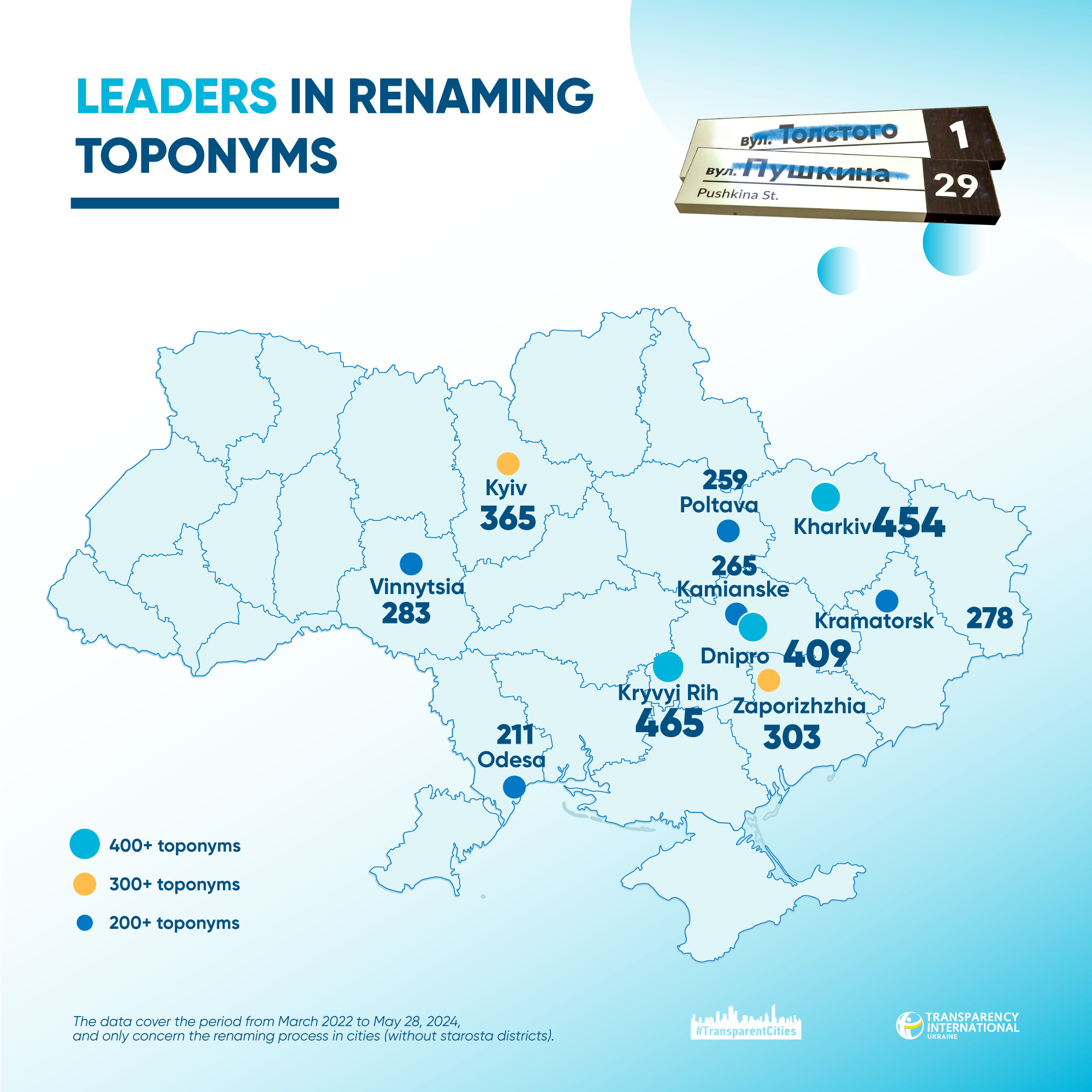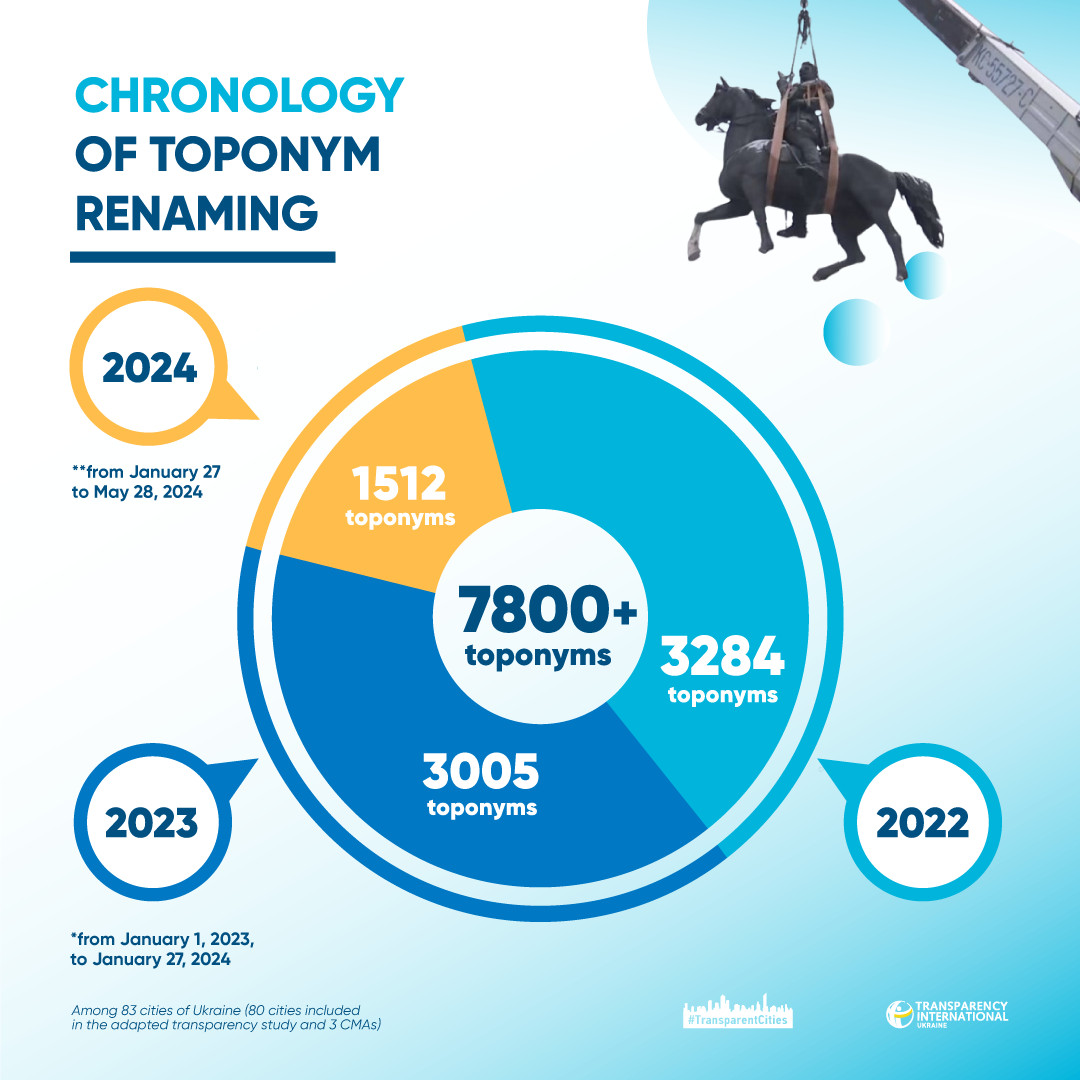7,800 toponyms were renamed in 83 cities from March 2022 to May 2024.
The Transparent Cities program (Transparency International Ukraine) presents these data in a new study on decolonization at the local level.
Program analysts studied the derussification of toponyms in 83 cities of 23 regions from March 2022 to May 28, 2024. 80 cities of the adapted study of transparency in cities and 3 city military administrations (Pokrovsk, Kramatorsk and Kherson), whose experiences had been researched in previous years, were chosen for the analysis.

Kryvyi Rih, Kharkiv, Dnipro, Kyiv, Zaporizhzhia, Vinnytsia, Kramatorsk, Kamianske, Poltava, and Odesa are the leaders in terms of renaming toponyms.
In the west of the country, the cities under study have lower rates of toponym renaming because they began to remove Russian names from their urban spaces at the time when Ukrainian statehood was restored in 1991.
Vinnytsia, Drohobych, Dunaivtsi, Mukachevo, Ternopil, and Khmelnytskyi state that they completed the decolonization process.
The highest number of toponyms was renamed in 2022, namely 3,284, which is 42% of the total number of names changed. In 2023, the cities changed about 3,000 names.

From late January to mid-May 2024, cities became more active and renamed more than 1,500 toponyms. Some cities changed a significant number of toponym names literally in the last few days allotted by the law on decolonization. Kharkiv mayor Ihor Terekhov issued an order to change the names of 387 objects on April 26. The situation was similar in Pavlohrad and Odesa. Some municipalities stalled the process of decolonization. In Zhmerynka, a year passed between surveying citizens and renaming. However, by law, consultations cannot last more than a month. In Mykolaiv, the process got rolling only this spring: the head of the toponymic commission explained the delay by the lack of a quorum at almost every second meeting.
“The process of renaming had its difficulties. These included the low level of communication between the authorities and residents regarding the selection of names, the sometimes weak engagement of citizens in making proposals, and the lack of real tools to influence situations when the expectations of the citizens did not correspond to the vision of the authorities. Successful decolonization and effective local governance require an honest and mature dialogue between the authorities and the community and a proactive position on both sides,” says Viktoria Onyshchenko, analyst of the Transparent Cities program.
Positive approaches of city councils include providing information on derussified toponyms in a separate section on their website. For example, lists of renamed toponyms were developed in Dnipro, Kyiv, Kropyvnytskyi, Lubny, Oleksandria, and Okhtyrka. Kyiv City Council created a separate dashboard containing information on the engagement of citizens in toponym change. Sumy City Council creates short introductory videos about new toponyms.
At least 650 names in Ukrainian cities are to be derussified, so the process of renaming toponyms will continue.
Citizens can and should influence the change of names of urbanonyms. If there are proposals or in case of disagreement with the approved names, residents can:
- submit petitions demanding to rename toponyms, cancel the decision to rename toponyms, or initiate reconsideration of names for individual objects;
- instruct council members to put the issue of renaming certain toponyms on the agenda for consideration / reconsideration;
- submit a local initiative requesting to rename urbanonyms or reconsider “problematic” names/
Citizens can also submit an appeal to their regional military administration, containing a proposal, complaint, or statement regarding the renaming of toponyms. This can be done both in electronic format and in person.
A step-by-step instruction on how to join the decolonization process and influence the change of toponym names can be found in the guide that the Transparent Cities program presented last year.
Transparency International Ukraine is an accredited chapter of the global movement Transparency International. Since 2012, TI Ukraine has been helping Ukraine grow stronger. The organization takes a comprehensive approach to the development and implementation of changes for reduction of corruption levels in certain areas. TI Ukraine launched the Transparent Cities program in 2017. It aims at overcoming corruption at the local level and promoting the best practices of transparency and accountability.
During 2017–2022, the program annually compiled the Transparency Ranking of the 100 Largest Cities in Ukraine. After the full-scale invasion, the program launched a study of the state of municipal transparency of 70 rear cities in the conditions of a large-scale war with Russia. Back then, three city councils were recognized as transparent, 3—as partially transparent, the remaining 10 cities were recognized as non-transparent. In 2024, the team presented a second study evaluating 80 cities. 5 cities were recognized as transparent, 23 were partially transparent, the other 52 cities were recognized as non-transparent.